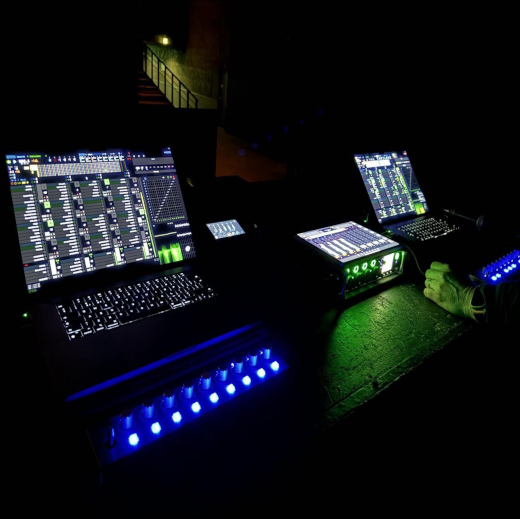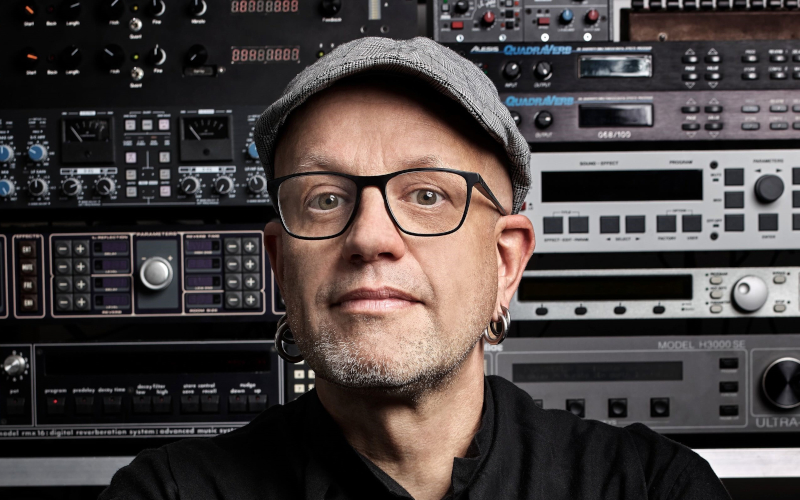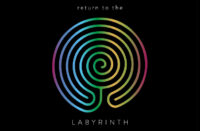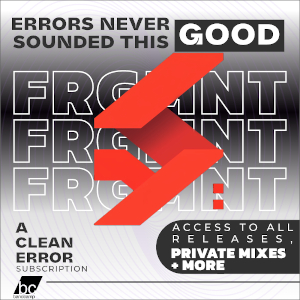
(LAUGHS) That’s so good to hear! I mean I know most people on the planet looked at that and were just like, “Is that you, God?!” (LAUGHS) but I’m so happy to hear that one of the stewards of Max MSP now is like, “I don’t know what they’re doing.” That’s great. Thank you.
RH :: Honestly, first of all, the one thing that you really have to admire about them is they do exactly what they like. That also infuses a quality of itself. I don’t need to like everything they do to admire the fact that they’re doing it.
Yeah, if anything they’ve taught me to be patient, that eventually the music will make sense. For instance I admit I was not entirely fond of Draft 7.30 upon release but lately it’s growing on me and I kinda get what they were trying to go for. As much as one can with Autechre.
RH :: Exactly. They are outstanding. They are a role model in terms of we do what we believe in. They are not occupied by how the bass drum has to be at 0 DB and has to be in tune with the bass line. All this tutorial stuff that makes everyone nervous.
(LAUGHS) Yeah, exactly. Sean Booth (of Autechre) has often said in interviews, “We’re doing this for us, like Rob and I. That’s it.” And they obviously do. There’s a shared trait, a parallel between them and Cabaret Voltaire. I do believe they’re from roughly the same area around Sheffield, both bands with working class origins. And I wonder if part of their fiercely independent, DIY approach is a fight against “the establishment” so to speak? I mean they’re our age more for less, and grew up seeing Thatcher destroy a lot of the industry and work in Northern England. So I wonder if there’s a certain amount of — I don’t want to say aggression, that’s too simple — maybe a natural impulse like “I want to mix it up, I want to get up and I want to really change things.”
RH :: Maybe it doesn’t even have to have that aggressive connotation. Because I believe it’s enough to say if you are for whatever reason not exactly fitting in the expectations of your society, you already have a good predilection to do something else. So a lot of artists, a lot of musicians are somewhat oddballs, and that gives them the –
(LAUGHS) Oddballs? Really? Not you. I’ve never noticed it, sir. You seem perfectly normal and not at all strange.
RH :: (LAUGHS) But you know what I mean? I was an unhappy teenager for many reasons, and I didn’t feel comfortable in my environment. And I did escape by listening to Tangerine Dream and stuff like that. And If you look at the biography of so many artists you admire, they were also always struggling a bit with their environment. And they found an escape by saying, “Well, I’m different. This is what I’m doing.”
Exactly. They found their calling. That’s what it is! It’s not hostility, it’s DIY! The willingness to do it yourself and hunt down that thing, the thing which compels you, drives you. Some kids in the 1970s go see The Buzzcocks, go buy a bass and a guitar, learn songs with your band, then become Joy Division or Cabaret Voltaire or something. Just do what’s got to be done. It’s that willingness to find your way out of your situation to your, I want to say, I don’t know, your dream, your Mount Olympus?
RH :: Yes, I also believe that actually a certain misunderstanding or dismissal of your environment towards what you’re doing is actually helpful because it forces you to become clear about what you do. If your environment says, “What you’re doing is shit!” but something deep inside you tells you, “No, it’s not!” then this has to come to the surface, at least for yourself. You need to stand in front of the mirror and say, “Well, I like what I’m doing.” This is also empowering. As an opposition, if you do techno these days where everyone is doing techno, it’s so hard because how can you shape your own profile, if everything you do is just like what everyone else is doing? I’m happy that I grew up in a generation where music teachers were still debating if drum computers are evil.
(LAUGHS) Exactly! I took piano lessons from a woman down the street who survived a Ukrainian concentration camp, the Nazis then the Russians and then came to the states to teach snot-nosed American kids piano! (LAUGHS) Anyway, I took lessons for a year or so until we came to a mutual agreement: I was not practicing and she didn’t want to teach me.
RH :: (LAUGHS) Yeah, exactly.
But I remember just telling her how cool an SH-101’s arpeggiator was, what it could do. And she’s like, “Oh, you mean like this?” then takes the two weakest fingers on her hand and proceeds to go (imitates a steady 16th note beep-beep-beep synth bass-line) at like 150 beats per minute. I was so deflated! (BOTH LAUGH). Now that you mention it, I was curious about your growing up, did you grow up in Berlin or did you grow up elsewhere?
RH :: No, I come from Munich, which is a beautiful town with a beautiful river, but it was, at least in the 1980s, to a large extent, extremely conservative.
Never been but I’ve heard it’s lovely.
RH :: Yes, it’s conservative to a level of being reactionary. If you didn’t fulfill certain expectations, certain standards, you had a hard time. I really felt that I didn’t feel it. And as soon as I had the chance to, I moved to Berlin. And I just happened to move to Berlin in the early 1990s, or early 1990. So right after the wall came down. And it was a city where everything was undefined. And that helped me tremendously finding my own path because this place was full with people who were curious and who were open.
That sounds amazing. I grew up outside of New York City in a town that was Reagan country, Wall Street’s bedroom, so I know exactly what growing up like that was. But there’s something about when a city is in turmoil like Berlin was then. I remember visiting my father’s office in New York City with my mom in the 1970s. On the one hand the cops were telling her to hide her jewelry when we got on the subway because NYC was a mess, but then there was all this great stuff happening with CBGBs and bands like Suicide, and Talking Heads to name a few. And from what I’ve heard and read the same thing seemed to be happening in Germany at the time you arrived in Berlin.
RH :: Yes, exactly.
I wish I’d been there. I’ve always been more interested in what’s going on there than here. A friend said to me the other day, “You’re a European in an American’s body.” I said, “I know. It’s terrible.” Because my heart and head always look east at what music and art are being produced. Anyway you said you’re from of engineers and had some music education in school.
RH :: Yes, the positive aspect of growing up in Munich, which was a wealthy city, was the education system was good. I was in a pretty decent high school that allowed me to — for instance — learn a lot about physics because I had a good physics teacher. It allowed me to understand music thanks to a music teacher who was conservative but still able to teach people. That was okay.












![Pole :: Tempus Remixes (Mute) — [concise]](https://igloomag.com/wp/wp-content/uploads/2025/04/pole-tempus-remixes_feat-75x75.jpg)






![Hasbeen :: Bunker Symphonies II (Clean Error) — [concise]](https://igloomag.com/wp/wp-content/uploads/2025/04/hasbeen-bunker-symphonies-ii_feat-75x75.jpg)

